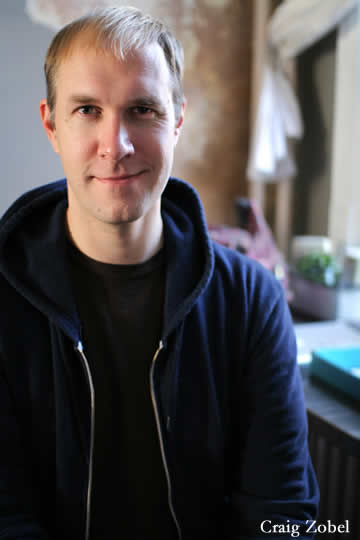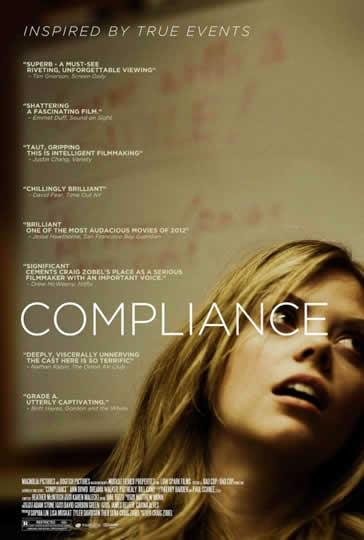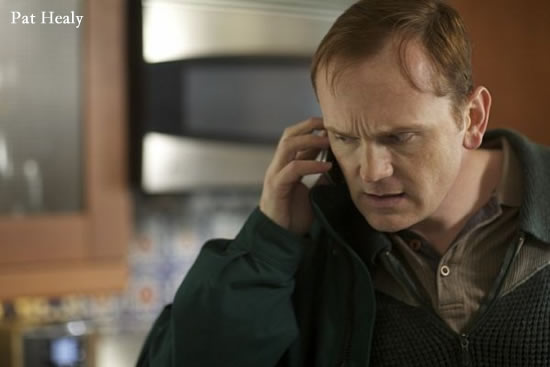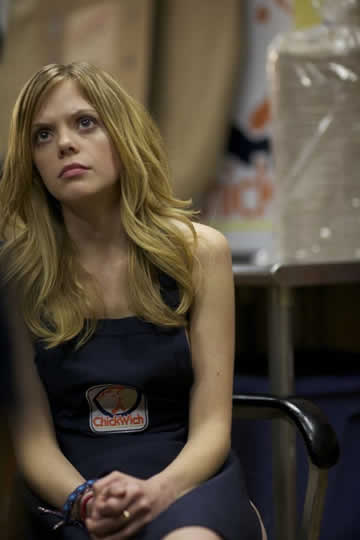 Inspired by a chilling true story, Compliance explores just how far one might go to obey a figure of authority. On a particularly busy day at the local ChickWich, the fast food joint’s high-strung manager Sandra receives a phone call from a police officer saying her employee Becky has stolen money from a customer. Convinced she’s only doing what’s right, Sandra commences the investigation, following step-by-step instructions from the officer at the other end of the line, no matter how invasive they become.
Inspired by a chilling true story, Compliance explores just how far one might go to obey a figure of authority. On a particularly busy day at the local ChickWich, the fast food joint’s high-strung manager Sandra receives a phone call from a police officer saying her employee Becky has stolen money from a customer. Convinced she’s only doing what’s right, Sandra commences the investigation, following step-by-step instructions from the officer at the other end of the line, no matter how invasive they become.
Compliance, One of the most controversial and talked-about films at the 2012 Sundance Film Festival, is the second feature from Craig Zobel, director of the 2007 Sundance hit The Great World of Sound.
We had the opportunity of interviewing, Craig Zobel, director of Compliance and Pat Healy that plays the part of officer Daniels.
Bijan Tehrani: How did you come up with Compliance story?
Craig Zobel: I had actually been reading about the Stanford Prison experiments that were performed by a psychologist in the 1960s. These experiments were studying the prison effects during World War II. This psychologist did an experiment where two people enter a room and the experimenter says one will be the learner and the other will be the teacher. It was an experiment on negative reinforcement, so they take the “learner” and put him in a room and attach electrodes to his head. They close the door and sit the “teacher” down in front of a switch box that has different voltages. They instruct the teacher to electrically shock the learner when he provides the wrong answer. Of course it was not real, the learner was actually an actor and there was no real electricity. The test occurred was when the actor said, “I do not feel comfortable with this and I want to stop the test.” The teacher would turn to the scientist and say that the test should be stopped. The real experiment would begin when the scientist would say “No “and that “It is your responsibility to continue, and not worry. Just do what I say.” I was really fascinated because 60-70% of the people that were tested ended up complying with the authority figure, giving lethal amounts of electric shocks. So I was fascinated with that and I uncovered these true stories that were used as a real life example of what was happening in those experiments.
BT: In this country, it seems as though we don’t protest higher powers and we are very obedient when it comes to the word of authority.
CZ: That is an interesting point; I did have that in mind when I was making the movie. It’s funny because when we screened this at our first film festival, it was this big debate; I am not sure where I stand—I am certainly an American, but I like to think that this is bigger than the national situation.
BT: I feel like we trust our leaders and our authority figures, but in other countries they are aware that they are crooks. 
CZ: I guess that is true, ultimately we are confident in our leaders. I think in some ways it is true that Americans don’t question their leaders a lot, but I do think that the problem is a bit bigger than that.
BT: Compliance has a totally different style, but it has a Roman Polanski-esque approach to life in it.
CZ: I appreciate that comment; I am a very big fan of Polanski. He is a titan in filmmaking and I feel that he is a very interesting filmmaker, especially his films in the 70s. I look at his filmmaking as being very impressive and he knows about tension, he knows how to do tension right and it was fun to explore that in this film.
BT: How did you go about casting your film?
CZ: It was different for every role; we tried to cast the Sandra Manager role and Becky as the employee, so we tried to cast those two roles first and then cast all the other roles around them. I found Ann Dowd; she was in a play off Broadway in New York with Ethan Hawke called “Blood From a Stone”. I just thought that this was amazing and she was this really powerful actress, and I just pushed her with it. She found the project to be really interesting and it made a lot of sense for both of us. I cast the people who had the same questions about the materials that I did, and people who were fascinated with how this kind of stuff could happen, because then they would be the people who would be able to really explore it with their performance and give nuance and layers.
BT: What is the next project that you are working on?
CZ: I wrote a script based on a true story about a Swedish mafia person who ended up becoming a European tech-executive and kind of pulling this crazy scheme, and I think it is going to be funny. It is a different kind of movie than this but I am very excited to do it and I am trying to get that going. At the same time I am marching towards production on that, there have been other projects that have come along.
BT: Sounds intriguing, best of luck to you!
 Interview with Pat Healy
Interview with Pat Healy
Bijan Tehrani: How did you first encounter the idea for Compliance and what made you decide to accept the role?
Pat Healy: The director Crag Zobel and I are good friends we made a film together called “Great World of Sound” about five years ago, so we have a good relationship. He sent me the script which I thought was an excellent script but also very disturbing. The part he asked me to play was very disturbing to me and I was not sure if it was something that I wanted to do. But I would be hard pressed to find reason to not want to work with him. So even though I was reluctant to play the part, I knew it would be a great film and I knew it would force me to explore myself further as an actor.
BT: Did you have a lot of rehearsals? How did you communicate with the directors?
PH: We had many conversations in pre-production, and a few rehearsals. I was so separate from everyone else, we would talk on the phone and he would give me ideas about what to do, how to behave and how to handle each session. We also did some research and watched the television show “COPS”, taking notes from the police officers and studying how a police officer would handle certain situations. He didn’t just hire me because he thought that I would be good for the role but also because we had a sure hand from working together before. He knew that he could leave me alone and trust that I would know what to do. So I had a lot of free range to do what I wanted to do and I knew what he wanted so it was easy in that respect.
BT: Is it difficult for someone like you who is a director, to work with another director?
PH: I was an actor first; I got into acting because I love movies and wanted to make films. I’ve made short films and I have a career as a screenwriter. With a good  director and a good screenplay, like we have here with Craig, you feel like you are in good hands and you just need to do your job as an actor. If the script works, you can ask questions and if you want to try something, a good director is always going to welcome that. I never feel like I need to take the reigns to Craig because his work as a writer and director is solid.
director and a good screenplay, like we have here with Craig, you feel like you are in good hands and you just need to do your job as an actor. If the script works, you can ask questions and if you want to try something, a good director is always going to welcome that. I never feel like I need to take the reigns to Craig because his work as a writer and director is solid.
BT: It is impossible to watch Compliance and not have an opinion on it. What do you think about the finished film?
PH: I agree, it is very disturbing and hard to watch at times. But I think it is an important film and it forces us to look at things we would rather not think about in society; it makes us ask ourselves about obedience to authority and a lot of important questions about why something like this happens and reminds us about situations that we have been either victimized-in or been the victimizers. It encourages us to question authority by showing us a true account of its existence.
BT: Your performances in “The Great World of Sound” and “Compliance”, exhibit a touch of French-European style in your acting, which is very mute and believable without exaggeration. Do European films at all influence you?
PH: I’m a huge cinephile; I watch all kinds of films from many different countries. So many great actors have inspired me; one off of the top of my head is Alain Delon, who is very much an actor who is economical in his performances. He is very still and defiant, there is a lot of things with his eyes and he is someone that I very much look up to, he is like the French Steve McQueen; but there are many actors that I admire from all over the world—French, Italian, Iranian, Russian and German. It is interesting to watch actors in a European film because the emphasis is not on the words, you are really watching their faces more and you absorb the nuances of their performance.
BT: Your performance reminded me of Alain Delon in Le Samourai.
PH: Yes, thank you, it is not the same character and same purpose, but the economy of the performance is similar and that is definitely the school of acting that I subscribe to.
BT: What is the next project that you are working on?
PH: I’m not sure. I am writing some things: I wrote something for HBO films and I am just waiting for the next item to come in.

